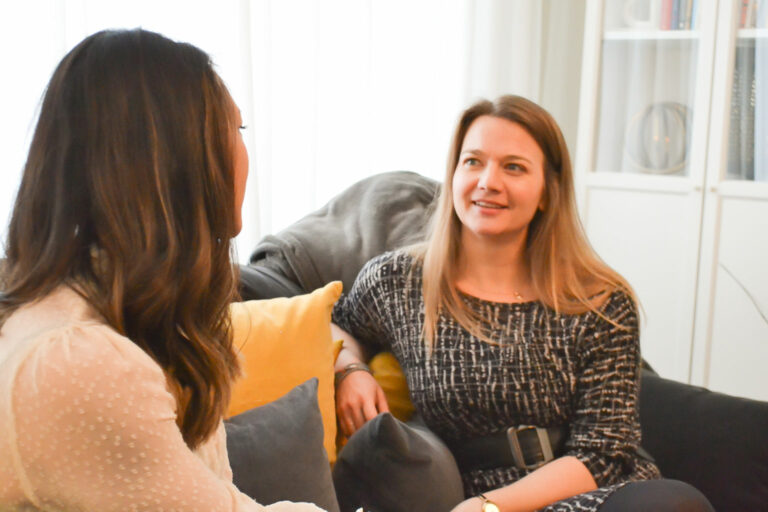
44 – Honouring and Setting Boundaries with Julie Long
- Safe Harbour Therapy Centre
Subscribe: Apple Podcasts | Google Podcasts
“A Boundary is a Limit that Protects Integrity.” Anne Katherine
Covid 19 has shifted our lives in many different ways. These shifts have challenged us to adapt to new ways of moving through the world. Whether it’s working from home alongside your children, partner, and furry family members or maybe it’s working with different technology or time frames. Perhaps you’ve had to be alone more than you are used to and not being able to access the people are places that fill your life with joy.
Boundaries is a term we hear more often these days. If you think of a boundary you might think of a fence or a border. Boundaries are lines or limits and when changes are happening in our lives, these lines or limits can be challenged.
Boundary setting, or setting limitslike saying no, can be difficult for many people – especially with loved ones or colleagues where there are life changing consequences involved like a pay check at work. Defining our own boundaries, noticing when our boundaries have been crossed, and communicating those limits are topics that comes up often in therapy. Over the years, I have referenced a book written by Anne Katherine called Where to Draw the Line: How to Set Healthy Boundaries Every Day.
What I love about this book is that it sets practical boundaries for everyday moments in life like in our relationships, with our time in our schedules, with our emotions like anger or even happiness; and with setting boundaries with our energy and actions like what to eat and how long to be on social media, and so much more!
I think it’s important for us to know what helps us and what hurts us in our lives so we can protect ourselves as we navigate our day. If we honour the boundaries in our life then our chances of feeling well in our life is greater.
I think one of the things many people struggle with, that has become apparent during this pandemic, is how we spend our time; and how those decisions affect how we feel and interact with others in our lives. I can recall many people noticing over the last few months that they were forced to slow down during the pandemic. It forced them to look at and notice the busy pace in which we usually schedule our lives. I think at first people were uncomfortable because they were used to moving so quickly. But I think over time, people grew to like the slower pace. The time to wake up a little later without having to quickly get the kids ready, jump in the car to rush through traffic in order to drop off kids before arriving at work on time (hopefully). Because of covid, people have started their day a little later, have eaten together as a family, and gone outside to spend time together rather then rushing to evening activities, separately.
As we all begin to reopen and move forward in life, I wonder if there are changes you’d like to make with how you spend your time? Are there activities you want to continue, no matter what? If so, I wonder if you can block off your schedule so that you can continue those activities as the demands of your old way of living start to come up? Setting firm time boundaries but allowing for some flexibility so that you can hold true to your new priorities will hopefully enable you to continue this newer feeling of ease as you balance your obligations moving forward in life.
With all of the changes covid brought upon the world, our limits have been tested with having to stay at home when maybe you are used to being in different environments and interacting with different people. Our limits may have been tested with needing to learn new technology or spend more time with kids and multi-tasking many things all at once. For many people managing our emotions when we are stressed can be quite difficult during every day life. If people were struggling with regulating their emotions before covid, they may have been tested way beyond their limits because of all the challenges that have come with covid. When we are overwhelmed, some people act out with words or behaviours to release their stress. They may become verbally, physically, emotionally, or sexually abusive. Others may shut down and become quiet or need more time by themselves. This distance from their loved ones may cause confusion or hurt feelings. Still others may need to numb out their discomfort and seek out substances to quiet their discomfort: like food, alcohol, drugs, online-shopping or pornography, binge-watching tv, etc. These are the fight flight freeze reactions but there are other terms like submit, collapse and fawn. Letting go, shutting down, and saying yes when we really mean no because we don’t have the capacity to protect ourselves with setting healthy boundaries can escalate the feelings of distress.
So what are the options to protect ourselves, to protect our boundaries, when life is intense and people are spilling over each other?! Anne Katherine suggests to first assess your own risk. If you, your loved ones, your livelihood or your home are in danger if you set boundaries, then that is very important information to take into consideration before addressing the situation. Some people are not in a space to hear, understand, or accept responsibility for when they spill over onto others. In these cases it may be in your best interests to reach out for help in setting those boundaries in a more physical way like with distance or relocation rather than threatening your safety by trying to verbally come to an understanding or trying to get someone to change. If you are not at risk, then there may be more options in protecting your well-being.
It’s important to understandthat boundary violations are not okay. Adverse life events happen to everyone. Taking out our frustrations on others when we are hurt is not okay. We are responsible for regulating our own emotions. We are human and we make mistakes but rationalizing someone’s behaviour because of their traumatic past hurts us and it hurts them. You are important and have a past, too. Violating our own boundaries is a thing too! Making yourself a priority is an important step to navigating a boundary violation. Just like flight attendants demonstrate to put your oxygen mask on first before assisting others, putting your boundary needs first in a relationship is best for all people involved.

So how do you know your boundaries have been crossed? You will most likely have an emotional response like anger, anxiety, or maybe you may feel like you can’t move or speak, or maybe you find yourself saying or doing something as if you are on autopilot then when you are out of the situation you might ask yourself, why did I do that and with that realization you may then have an emotional reaction. Everyone is different but the response will be unpleasant.
Once you’ve noticed your boundaries have been crossed, it might be helpful to ground yourself so you can think clearly about what happened that upset you. If we respond immediately when we are in an defended state, we may create a bigger problem. It takes time to ground so we can view the situation from a distance. You may want to talk it out with someone or journal it. Honouring your feelings is honouring your boundaries.
Communicating our feelings about the boundary crossing is important for ourselves, the other person, and the relationship. But it isn’t easy! Sometimes it helps to have a format which I learned as a guidance counsellor and it’s called an ‘I message’. And I’m not referring to the iPhone but the pronoun I. Using an example to explain the boundary crossing from your per perspective along with an expression of your need to protect that boundary. For instance, ‘when you check your phone when I’m talking to you, I feel like you aren’t listening – like I’m not important. I’d prefer if you look at me so I know your listening and then check your phone after our conversation’.
I know from personal experience that this is hard to do because we don’t want to hurt people’s feelings or maybe we think the person will have a big reaction and conflict will ensue – which no one wants. If we are honest and set a clear, kind, boundary, then it will be less messy in the long run! Sometimes knowing how to set boundaries isn’t enough – we need help maybe because we have a core belief that we are not enough or not important and so don’t deserve to set boundaries. Or maybe you’ve had experiences in the past where you’ve set boundaries but it has not gone well and now you’re afraid. If you need help, reaching out to a therapist can help shift those core beliefs so that it’s easier to communicate when your boundaries have been crossed and state your needs so that you can navigate the inevitable conflict in life in a less distressing way.
I think it’s also important to note who in your life feels approachable so that when conflict happens, sharing your feelings feels doable. Are you surrounded by people in your life who are willing to listen? Validate your feelings? And make efforts to shift so that they don’t hurt you again? Or are there people in your life who refuse to listen? Minimize or dismiss your feelings and keep repeating the same behaviours? Once we are able to notice those respectful people in our lives, we may be more choosy about who we let in so we are better able to navigate our lives and enjoy the view.
If you’d like some help in learning what your boundaries are and how to navigate them, check out the Safe Harbour Therapy website and reach out to a clinician to start your journey.
Katherine, Anne (2000). Where to Draw the Line: How to set Healthy Boundaries Everyday. New York, NY: Fireside.
